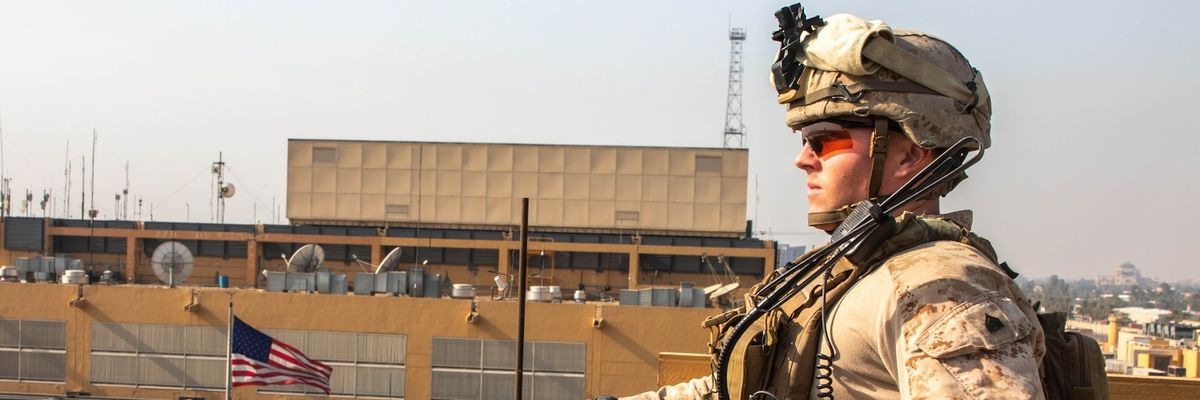Congress’s momentum toward finally repealing the decades-old Iraq war authorization has hit a speed bump. After the House of Representatives in June overwhelmingly voted on a bipartisan basis to pass Rep. Barbara Lee’s (D-Calif.) bill to revoke the 2002 Authorization for Use of Military Force, similar efforts in the Senate have hit a temporary standstill.
President Biden has twice launched strikes against militias in Iraq that he says are attacking U.S. troops with support from Iran. Even though both times he relied solely on what he believes to be his constitutional commander-in-chief powers, senators are delaying progress on a 2002 AUMF repeal bill by Sens. Tim Kaine (D-Va.) and Todd Young (R-Ind.), citing a desire to give the president authority for more military confrontation with Iran and its proxies. But let’s be very clear: this purported concern about how repealing the 2002 AUMF would affect the president’s ability to strike Iran-backed armed groups is a red herring.
When Congress authorized the Iraq war in 2002, it made abundantly clear in the ensuing debate and in the text of the authorization itself that it was approving force against Saddam Hussein’s government. Today, Saddam Hussein is long deceased, the Iraq war has been over for a decade, and U.S. leaders frequently laud the current Iraqi government as a close partner. Thus, any argument that the same authorization Congress gave President George W. Bush to conduct regime change in 2002 now justifies striking Iran-affiliated armed groups in 2021 is specious and falls apart under scrutiny.
It is true that both the Obama and Trump administrations erroneously leaned on the 2002 AUMF as a secondary justification for conducting lethal strikes long after the original Iraq War ended. But those examples are not evidence that the authorization should be maintained — to the contrary, it is the strongest evidence for why it should be scrapped. Both presidents were wrong to abuse this outdated authorization, and that is exactly the kind of expansive presidential warmaking that Congress is supposed to counteract per its constitutional mandate as the branch of government tasked with determining where and when the nation goes to war.
Revoking outdated use of force authorizations is a critical first step on a longer path toward restoring these checks and balances. This is not about mere procedural box-checking: the reason for the separation of war powers is to ensure that each potential new conflict is rigorously examined and debated on the merits before it begins, and that our leaders face democratic accountability for their life-or-death decisions. War was never supposed to be the default, operating on autopilot in perpetuity.
To his credit, President Biden has broken with his predecessors and refrained from even attempting to justify his strikes with the 2002 AUMF. In fact, the Biden administration has explicitly backed repeal of this long-outdated authorization. Unfortunately, President Biden has instead chosen to assert a dangerously broad interpretation of his inherent constitutional powers. But this illustrates even further how immaterial Iran is to the debate at hand. Not even the administration conducting the strikes is claiming it wants or needs the 2002 AUMF. Thus, warnings about tying the president’s hands of the ring hollow when the president’s metaphorical hands are already freely dropping bombs without even the pretense of congressional authorization.
The administration has insisted these bombings are necessary to “disrupt and deter” Iran-backed militias attacking U.S. troops in the region. Yet such attacks continue, undeterred. Clearly tit-for-tat strikes are not having the desired effect, and there is no reason to think that more of the same will have a different result. If members of Congress truly want to protect U.S. troops from attack, a better approach would be to remove them from the region altogether.
The Iraqi government has made it abundantly clear that it does not want to host an escalating U.S.-Iran proxy war. And whether seeking to address challenges posed by Iran or transnational terrorism, the U.S. government cannot achieve its goals through military force in Iraq. So long as the United States ignores this reality and maintains a military presence in the region, troops remain susceptible to targeted attacks.
The issue of Iran is quite simply irrelevant in the debate over repeal of the 2002 Iraq war authorization. If Congress wants to debate and vote on a new war against Iran, it should summon the political courage to do so instead of hiding behind an unrelated and outdated Iraq war authorization. And, if recent history is any indication, such an effort would be met with swift and strong grassroots opposition across the country. But in the meantime, the Senate should treat the 2002 AUMF as the wholly separate issue that it is, and join the House in acting quickly to repeal it.
















